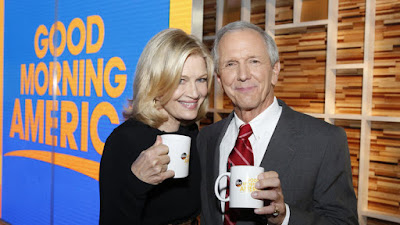 |
| (Heidi Gutman / AP) |
The network's Times Square studio was packed with names from GMA's past, including its first host, David Hartman, and longtime favorites Joan Lunden, Charlie Gibson, Diane Sawyer, Spencer Christian and Sam Champion.
They reminisced about the show's serious and silly moments over the decades. Gibson and Sawyer recalled being on the air during the 9/11 terrorist attacks in 2001. They also replayed a clip of Gibson cracking up as Lunden held up a Vanna White doll wearing a tiny top that kept falling down.
Such is the nature of morning TV. "GMA" is responsible for expanding the genre after NBC created it with "Today."
Before "Good Morning America" came along, "Today" owned the bulk of the morning audience since its launch in 1952. CBS offered an hour of straight news and aired children’s program "Captain Kangaroo" in the morning. Cable news networks didn’t exist, and most non-network TV stations did not produce local news.
ABC, led by legendary programming executive Fred Silverman at the time, sensed an opportunity in 1975. The network was dominant in prime time and had hired Barbara Walters away from NBC, where she had been an audience favorite on "Today" for 12 years. After a false start in the morning with a show called "AM America," the network launched "Good Morning America" on Nov. 3, 1975.
While "Today" was less formal than most news programs in the early years of TV, "Good Morning America" loosened it up even more with the concept of a morning show "family." The first "GMA" anchors — Hartman and Nancy Dussault — were actors, not journalists. The program's set was designed to resemble a comfy suburban home. The wide range of contributors in the first year included roaming reporter Geraldo Rivera ("the wild child," as he recently described himself), gossip maven Rona Barrett, investigative journalist Jack Anderson and humorist Erma Bombeck.
As a breezier alternative to "Today," it took "GMA" only a few years to become competitive with NBC's franchise. By 1982, when Hartman was teamed with Lunden, "GMA" pulled firmly ahead. While "Today" has spent more years as the ratings leader over time, ABC's successful formula helped reshape network morning television, which moved to a lighter tone and a greater emphasis on relatable anchors.
Current co-anchor Robin Roberts, who joined "GMA" in 2002, said the connection to the morning audience remains the defining characteristic of the program.
"There is something very intimate about morning television," she told The Times in a recent interview. "People feel like you're a part of their family. They grow up with you. And they see you grow up. There is no other place where you can share so much of yourself and it's expected. The viewers want that."
Roberts said when her health crisis struck in 2012 — treatment for a rare blood disorder kept her off the program for six months — it was the support of viewers that helped see her through.
"People stepped up and said, 'We got you,' " she said. "I'm indebted to many people that I will never meet. People were really worried about me."
The stature of the anchors on "GMA" over the years also reflected how morning TV had become the largest profit centers at the three broadcast network news divisions.
When "Good Morning America" needed to be rescued from a deep ratings slump in 1999, ABC turned to its biggest star, Diane Sawyer, to help turn the program around. She agreed to a four-month assignment as co-anchor, which became an 11-year run.
Once "GMA" became No. 1 in the ratings on his watch, in 2012, ABC was so determined to keep co-anchor George Stephanopoulos on the program that it agreed to give him the title of chief anchor for ABC News when his contract came up last year.
At the start of his run, the serious Stephanopoulos, who had been covering Washington and anchoring "This Week," did not seem like an ideal fit for the lighter and brighter "GMA." But in his six years on the job, he said he's figured out how to handle the wide range of subjects and emotions that two hours of morning TV requires.
"What I've learned over time is to have as honest reaction as you can to everything coming at you," he said.
0 Response to "Good Morning America 40th Anniversary"
Thanks for give comment.